Discover the findings of a recent study linking consistent sleep schedules to the slowing of the biological aging process, shedding light on the pivotal role of sleep in overall health.
The Science of Consistent Sleep Schedules
This research, featured in the Sleep Health journal, suggests that individuals who maintain irregular sleep patterns tend to exhibit a higher biological age compared to those who adhere to a regular sleep routine.
The study, led by researchers from Augusta University, encompassed over 6,000 participants who took part in the U.S. National Health and Nutrition Examination Survey between 2011 and 2014. The average age of the participants was around 50 years old.
During the study, participants wore sleep trackers for four to seven days, monitoring their sleep duration and regularity. Additionally, they answered lifestyle-related questionnaires.
To assess biological age, the scientists examined participants’ blood samples, analyzing markers like cholesterol levels, diabetes indicators, and kidney health. Approximately 65% of the participants managed to obtain seven to nine hours of sleep each night, while 16% slept for less than seven hours, and 19% slept for more than nine hours.
The study unveiled that participants tended to gain an extra 78 minutes of sleep on weekends, with bedtime variations averaging only 60 minutes each night. Notably, those individuals who exhibited the greatest disparities in their sleep patterns throughout the week, especially between weekdays and weekends, displayed the highest biological age.
Specifically, participants with the most erratic sleep schedules appeared to have a biological age approximately nine months older than those with consistent sleep patterns.
The study’s authors remarked that this research marks the first of its kind to investigate the relationship between sleep habits and biological aging.
Notably, the findings have wider implications beyond aging, as a lack of consistent sleep can impact heart health by influencing stress hormone levels, potentially raising blood pressure. Moreover, inconsistent sleep patterns can have adverse effects on cognitive abilities and mental well-being.








Leave a Reply
You must be logged in to post a comment.